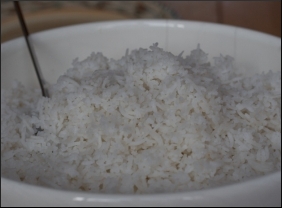|
|
|

|
Erosion of Doon Valley's pride: Basmati rice
|
|

|
|
| Top Stories |
 |
|
|
|
SME Times News Bureau | 12 Aug, 2019
Rice trader Ummed Bora, a resident of Dudhli Ghat in Uttarakhand here,
has just started sowing seeds for the Kasturi rice crop, an aromatic
variety of rice. While there was hardly any rain during June, steady
rainfall in the second week of July has given respite to the farmers in
the region.
July is when seeds of Kharif crops are sowed. Bora
has also planted a Type-3 paddy crop, which is popularly known as
Basmati rice. Known for its aroma, Doon Basmati is slowly losing its
place in markets all over the world owing to the increasing
urbanisation, pollution and lack of support from the government.
Vinod
Bora, a resident of Dehradun, claimed that at one point the fragrance
of the crop used to envelop the whole area. When Basmati rice would be
prepared, the aroma would reach the adjoining houses as well, he
reminiscenced.
While Basmati is still being grown in the area,
he mentioned, the area under cultivation and the income generated from
the crop have shrunk.
Even other types of Basmati rice -- Haridwar-Saharanpur -- is sold as Doon Basmati rice, he claimed.
Whether
it is Dudhli Ghat or Majra, the vast farms growing Basmati rice have
transformed into residential complexes and flats. Bora claimed that
farmers don't get proper compensation for their crops, but they get good
prices for the land.
The farmers are attracted by the profits
the selling of their land garners, asserted Ummed. He said that after
selling their land, they move to the towns for a job or child's
education, leaving their farms behind.
In 2017, Bora revealed
that he used to export a consignment of Basmati rice worth Rs 1.5 crore
to Germany. The next year it came down to Rs 50 lakh. The expected yield
this year is only Rs 20-22 lakh.
Chaman Lal, a farmer, said the
Basmati rice crop is very fragile and cannot withstand heavy winds.
Rains are always playing havoc and it rains at a time when it affects
the crop, he claimed.
He also blamed the Suswa river for the low
yield. There used to be a time when the water from the river could be
consumed without giving it much thought, but now it is unfit for
consumption, even for animals, he added.
As a testament to the
rising pollution, he informed, the water has also turned black and is
being circulated to the farms in Dudhli Ghat through canals for
irrigation. The water brings garbage and medical waste to the farms,
resulting in the low yield.
The contaminated water from Suswa
river has affected the aroma, for which it used to be famous, stated
Surya Prakash, another farmer. "The river whose water we used to drink
out of our cupped hands has turned into sewer.
"Nature has
changed, the weather has changed, rain patterns have changed and thus,
the scent of the Doon Basmati has also vanished," he said.
S.S.
Rasaily, Member Secretary of the Uttarakhand Biodiversity Board,
informed that a study has been sanctioned to find the reasons behind the
decreasing yield of Doon Basmati rice and the report was expected
within a few months.
He informed that there was no provision for
the storage of Basmati rice seeds and farmers take turns for storage
and preparation of the seeds. While this ensures quality control, there
is no way for someone to procure the seeds from the market, he stated.
Rasaily
said there is no record of how much the yield was 10 years ago, and
thus there is no way to find out how much it has declined. He said even
the Agriculture Department has no record of the trade.
The
Biodiversity Board member even alleged that the Agriculture Department
has not been taking any step to save the Doon Basmati.
Vinod
Bhatt, a member of Navdanya -- an NGO focusing on agricultural issues --
and part of the study by Uttarakhand Biodiversity Board, said the area
where the Basmati rice was being grown has reduced considerably in the
last two decades.
Bhatt said the yield of varieties like Kasturi, Pusa, Basmati 1, Pant 4 has also dropped.
In
addition, he said, rising temperature, declining fertility of the soil,
shortage of water for irrigation, change in rain patterns and usage of
chemical fertilizers have affected the taste and production of Doon
Basmati.
At one point, the air around Dudhli Ghat and Majar used
to be heavy with the fragrance of Basmati that rivalled sandalwood or
flowers.
Doon Basmati, which had created a space for itself in
the international market, is disappearing from the farms. Urbanisation,
lack of awareness, water pollution and lack of support from the
government has taken the crop to the verge of losing its place from
plates across the globe.
|
|
|
| |
|
|
|
|
|
|
|
|
|
|
|
|
|
|
| |
| Customs Exchange Rates |
| Currency |
Import |
Export |
US Dollar
|
₹91.35
|
89.65 |
UK Pound
|
₹125.3
|
₹121.3 |
Euro
|
₹108.5
|
₹104.85 |
| Japanese
Yen |
₹58.65 |
₹56.8 |
| As on 19 Feb, 2026 |
|
|
| Daily Poll |
 |
 |
| What is your primary "Make or Break" expectation from the Finance Minister this year? |
|
|
|
|
|
| Commented Stories |
 |
|
|
|
|
|
| |
|